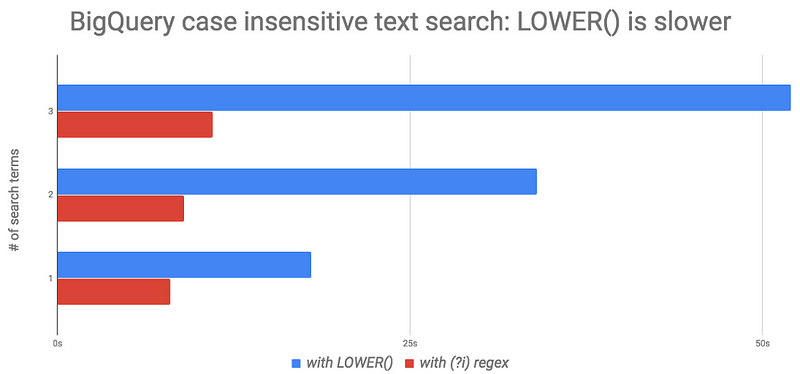I was stunned when some of my BigQuery queries were taking a minute or so, instead of the usual few seconds. The culprit: Case insensitive searches. The good news: There are ways to make them way faster.
Note from the team: Stay tuned! Very soon BigQuery will turn this advice irrelevant.
Note 2: Good news! BigQuery has rendered this advice obsolete — LOWER() and UPPER() behave way faster now. Will I blog about this? Stay tuned!
The problem
Processing gigabytes of data with BigQuery should be super fast. For example the following query performs a case insensitive search over 5GB of text in 18 seconds:
#standardSQL
SELECT COUNT(*) c
FROM `bigquery-public-data.hacker_news.full`
WHERE LOWER(text) LIKE '%bigquery%' # 18s
Usually BigQuery is faster than this, but the underlying problem becomes really apparent when adding new search terms. For example, when searching for 3 terms, a similar query takes almost a minute:
#standardSQL
SELECT COUNT(*) c
FROM `bigquery-public-data.hacker_news.full`
WHERE LOWER(text) LIKE '%bigquery%'
OR LOWER(text) LIKE '%big query%' # 34s#standardSQL
SELECT COUNT(*) c
FROM `bigquery-public-data.hacker_news.full`
WHERE LOWER(text) LIKE '%bigquery%'
OR LOWER(text) LIKE '%big query%'
OR LOWER(text) LIKE '%google cloud%' # 52s
How can I improve my query performance?
BigQuery performance tip: Avoid using LOWER()and UPPER()
LOWER() and UPPER() operations have a hard time when dealing with Unicode text: each character needs to be mapped individually and they can also be multi-byte.
There are 3 solutions that I covered on Stack Overflow:
Solution 1: Case insensitive regex
A faster alternative to
LOWER(): Use REGEX_MATCH() and add the case insensitive (?i) modifier to your regular expression:#standardSQL
SELECT COUNT(*) c
FROM `bigquery-public-data.hacker_news.full`
WHERE REGEXP_CONTAINS(text, '(?i)bigquery') # 7s# REGEXP_CONTAINS(text, '(?i)bigquery')
# OR REGEXP_CONTAINS(text, '(?i)big query') # 9s# REGEXP_CONTAINS(text, '(?i)bigquery')
# OR REGEXP_CONTAINS(text, '(?i)big query')
# OR REGEXP_CONTAINS(text, '(?i)google cloud') # 11s
Query execution time gets much better:
- 1 search term: 18s down to 8s
- 2 search terms: 34s down to 9s
- 3 search terms: 52s down to 11s.
Solution 2: Combine regexes
Why do 3 searches when a regular expression can combine them into 1?
#standardSQL SELECT COUNT(*) c FROM `bigquery-public-data.hacker_news.full` WHERE REGEXP_CONTAINS(text, '(?i)(bigquery|big query|google cloud)') # 7s
3 terms in 7s — nice.
Solution 3: Transform to bytes
This is uglier, but shows that
UPPER() and LOWER() perform way better when dealing with individual bytes — for equivalent results in these searches:#standardSQL SELECT COUNT(*) c FROM `bigquery-public-data.hacker_news.full` WHERE LOWER(CAST(text AS BYTES)) LIKE b'%bigquery%' OR LOWER(CAST(text AS BYTES)) LIKE b'%big query%' OR LOWER(CAST(text AS BYTES)) LIKE b'%google cloud%' # 7s
In closing
LOWER() is slower! Use the regex (?i) modifier instead.

Great Article, thank you for sharing this useful information!! really useful blog on kiranvasadibigdata
ReplyDeleteDevOps Training in Bangalore | Certification | Online Training Course institute | DevOps Training in Hyderabad | Certification | Online Training Course institute | DevOps Training in Coimbatore | Certification | Online Training Course institute | DevOps Online Training | Certification | Devops Training Online
Nice article I was impressed by seeing this blog, it was very interesting and it is Thanks for sharing all the information with us all.very useful for me. Thank you for sharing such great information very useful to us. It is very useful.Thanks for sharing.
ReplyDeleteoracle training in chennai
oracle training institute in chennai
oracle training in bangalore
oracle training in hyderabad
oracle training
oracle online training
hadoop training in chennai
hadoop training in bangalore